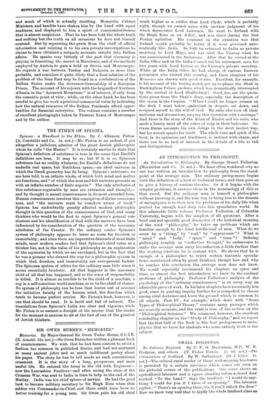THE ETHICS OF SPINOZA.
Spinoza: a Handbook to the Ethics. By J. Allanson Picton (A. Constable and Co. 5s. net.)—Mr. Picton is an ardent, if not altogether a judicious, admirer of the great Jewish philosopher whom he calls "the Master." It is 'certainly unwise to state that Spinoza's definition of substance is true in the sense that Euclid's definitions are true. It may be so ; but if it is so, Spinozan substance has no reality whatever, for Euclid's definitions do not underlie real space, but Euclidean space,—an ideal universe in which the Greek geometry has its being. Spinoza's substance, we are here told, is an infinite whole, of which both mind and matter are functions, and " of which the seen and felt universe presents us with an infinite number of finite aspects." The only attributes of this substance cognisable by man are extension and thought,— and by thought is meant consciousness in its most extended form. Human consciousness involves this conception of divine conscious- ness, and "the universe must be somehow aware of itself." Spinoza has undoubtedly greatly affected modern philosophic thought in this question of the consciousness of God, and many thinkers who would be the first to reject Spinoza's general con- clusions and his identification of God with the universe have been influenced by his consideration of the question of the necessary attributes of the Creator. To the ordinary reader Spinoza's system of philosophy appears to leave no room for freedom or immortality; and since these are imperative demands of most finite minds, most modern readers feel that Spinoza's chief value as a thinker lies, not in the value of his philosophy as an explanation of the mysteries by which we are enveloped, but in the fact that he was a pioneer who cleared the way for a philosophic system in which God, freedom, and immortality are ever-present factors. The Spinozan system of ethics for the ordinary man fails since it seems essentially fatalistic. All that happens is the necessary child of all that has happened, and so the sense of responsibility is killed. It is almost as terrible to be the child of a machine, a cog in a self-conscious world-machine, as to be the child of chance. No system of philosophy can be true that leaves out of account the initiative faculty of the human mind, the freedom which tends to become perfect service. Mr. Picton's book, however, is one that should be read. It is lucid and full of interest. The translations from Spinoza's Latin are clear and vigorous, while Mr. Picton is so earnest a disciple of his master that the reader for the moment is anxious to sit at the feet of one of the greatest of Jewish thinkers.






























































 Previous page
Previous page